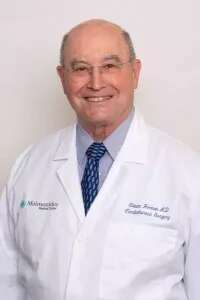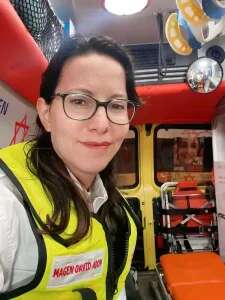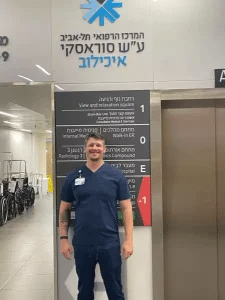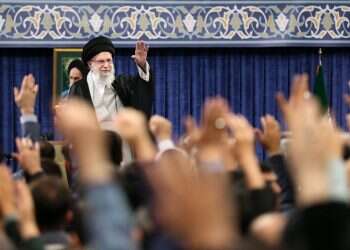Mere hours into the Oct. 7 onslaught, the Health Ministry received dozens of applications from medical teams abroad who wanted to come to Israel and volunteer.
Follow Israel Hayom on Facebook, Twitter, and Instagram
It received request from some 7,500 physicians from around the world, 450 of them with Israeli licenses. Of the applicants, 4,440 of them were from the United States, 1,000 from Europe, 500 from Canada and 150 from Australia. Most are Jewish, but many non-Jews have come to the aid of the country as well. The ministry ended up accepting 200 of the applications from those who had important medical knowledge, such as forensic medical experts who had experience helping with the identification of bodies.
"Exciting and strengthening solidarity"
"We're talking about very senior experts who are internationally renowned, who dropped everything to come," Dr. Shoshy Goldberg, Government Chief Nursing Officer (GCNO) from the Israeli Ministry of Health, who was responsible for coordinating the volunteer activities from these foreign doctors. "Those with an Israeli license had no issue coming here to volunteer, however, those with foreign licenses needed to be recognized here in Israel."
To do so, Goldberg said the Health Ministry "established a team that provided an answer to that obstacle within 48 hours. We accepted applications from those in the field of trauma, anesthesia, surgery and intensive care as those are the skills most needed to treat injuries from war."
"We're now fortifying Soroka Medical Center with four volunteer ophthalmologists due to the large number of eye injuries from shrapnel. Additionally, 10 volunteer anesthesiologists have arrived at Barzilai Medical Center after some of their anesthesiologists were called up to serve in reserves," she added.
Nefesh B'Nefesh, which each year eases the Aliyah process for medical professionals through its MedEx program, coordinated this initiative through its comprehensive database of Jewish physicians from North America – enabling the organization to contact those who wished to come to Israel and assist.
Thanks to the cooperation between Israel's Health and its Aliyah and Integration Ministries and The Jewish Agency for Israel, Nefesh B'Nefesh has assisted over 110 doctors from various specialties to Israel thus far, with more expected to arrive if the situation on the ground calls for it.
Tony Gelbart, Chairman and Co-Founder of Nefesh B'Nefesh, said, "Supporting Israel's healthcare system and finding an immediate solution for the physician shortage is extremely vital today," said Tony Gelbart, Chairman and Co-Founder of Nefesh B'Nefesh. "We are honored to lead this joint initiative, in order to immediately provide Israel with essential care while alleviating the pressure on the nation's healthcare system in areas where assistance is most urgently needed. In addition, Nefesh B'Nefesh is exploring ways to help solve Israel's long-term physician shortage as part of a broader strategic plan."
Aliyah and Integration Minister Ofir Sofer added, "The support, commitment and solidarity of our Jewish brothers and sisters in the Diaspora, particularly in North America, is a solid demonstration of support and strengthens the state of Israel."
Doctors making a difference

Dr. Steven Herman, a surgeon at the Division of Thoracic Surgery at Maimonides Medical Center in Brooklyn, N.Y., volunteered for two weeks at Barzilai Medical Center in Ashkelon in Ashdod. He helped dozens of soldiers and civilians and said he'd be eager to volunteer again if needed.
When he landed in Barzilai, he was only supposed to perform minor surgeries. Then, suddenly, things changed.
"The ground invasion into Gaza began and almost instantly our emergency room was flooded with wounded soldiers, many of them with shrapnel or bullets that penetrated into their bodies," he said. "We also saw blunt injuries like broken ribs from a fall. At Barzilai, I was considered a full-fledged member of the team and I'm thankful to Dr. Gil Ohana, the head of surgery there."
Dr. Herman first visited Israel in 1968 as a medical student. His son participated in a Masa Israel Journey program and his wife, who had a Zionist upbringing, came with him to Israel in her capacity as president of One Israel, an American NGO. She also volunteered, bringing aid and meeting with survivors of the Oct. 7 attack who were evacuated to Jerusalem.
Leaving her children behind to help those in need
Dr. Abigail Hankin-Wei, an emergency physician at Page Memorial Hospital in Virginia, volunteered with Magen

David Adom in Ashkelon.
"Nefesh B'Nefesh called me and connected me with Magen David Adom. For two weeks, I worked 13 shifts with ambulance teams, each shift being eight hours, where I helped respond to emergency calls," Dr. Hankin-Wei said.
"Between shifts, I would occasionally impart to my colleagues some knowledge I had about taking emergency ultrasound images when in the field," she added. "I was mainly focused on assisting the paramedics who were very skilled and had extensive knowledge. But sometimes we'd have different ideas on how to treat a patient."
Dr. Hankin-Wei considered staying longer in Israel, but she felt compelled to return to her three small children back at home.
"I'd be more than happy to come back if my skills are needed, especially now that my Hebrew has improved," she said.
Dr. Hankin-Wei made her decision to come to Israel after consulting with her family.
"One of the core values I took from Judaism is the commitment to repairing the world – tikkun olam. I believe that when a person is asked for help and can provide it, that they should do everything in their power to step up to the plate," she said. "When I committed to coming to Israel, the situation on the ground was unclear. So, I talked with my family and we agreed that if I could help and reduce putting other people at risk, then it's worth it."
From fighting ISIS to witnessing Hamas atrocities

For Dr. Andrew Griffin – an emergency medicine specialist at Conemaugh Memorial Medical Center in Johnstown, Pa., and a former staff sergeant in the U.S. Army – was well acquainted with working in war-time conditions.
"I was a volunteer doctor in the emergency medicine department at Ichilov Medical Center," he said. "There, I helped guide medical teams on how to better deal with incidents with many casualties and treated various war-related injuries. In addition, I joined the IDF in many exercises in the field and on bases. I was able to leverage my previous experience in the army and apply the lessons I learned in combat against organizations like ISIS to the current situation in Gaza and the Lebanese border, as I had an extensive background of providing medical assistance in combat zones under fire."
Dr. Griffin was in Israel for more than six weeks and plans to come back next month for another five weeks of volunteer service, both in hospitals and with the IDF. He also plans to get married in Israel on Jan. 23; his fiancé is an officer in the Air Force.
"Israel is our home. In the next few years, I plan to make Aliyah with Nefesh B'Nefesh because my heart is in Israel," he said.
He was heartbroken when he heard of the events of Oct. 7, not only because his fiancé was in the Air Force, but also for his girlfriend's sisters – a 20-year-old who serves in the Home Front Command and an 18-year-old who is based on the border with Lebanon.
"I spent October 7th and 8th worrying about what was happening in Israel. The pain and anxiety was real for all of us. There was a lot of uncertainty and a lack of information. When Simchat Torah ended on the 8th, I was crushed when I discovered the magnitude of what happened. Yet, I was relieved to see that when I turned on my phone my fiancé and her sisters were safe," he recalled.
"I couldn't focus on my work after that day. I immediately sought ways I could help. I spoke with my fiancé and asked her how she'd feel about me coming to Israel to help and she encouraged me to do so," he added.
"I found myself on a flight by October 14th and I received an emergency license from the Health Ministry that would allow me to practice medicine at Ichilov, and I immediately went to work once I landed."
Dr. Griffin received support from his family and coworkers back home, with one of his fellow doctors even going to Walmart to equip him with headlamps, batteries and hygiene products to take with him on the flight.
Since then, what disturbs Dr. Griffin the most – and what guides his volunteering efforts – are the atrocities that took place that day.
"The main thing I struggled with was the silence of so many who I considered my closest friends, non-Jewish friends from childhood, from medical school and even from the hospital where I work. These are people I value very much both on a personal and professional level," he lamented.
Subscribe to Israel Hayom's daily newsletter and never miss our top stories!
"Their silence was painful in a way that I don't know how to describe. These are people who know my fiancé and her family and they know that they are in Israel and never sent any messages of support. Nothing. As if nothing ever happened."
He added, "I'm no stranger to antisemitism. I can't count the number of times families in hospitals have told me they don't want me to treat them because they don't want to be treated by a Jew after noticing I wear a kippah. That's only the tip of the iceberg. I've never used the Holocaust as a focal point of my Judaism. But the lack of response from my friends is making me reconsider a question that surfaced on social media, 'Who of your non-Jewish friends would help hide your family?'"




